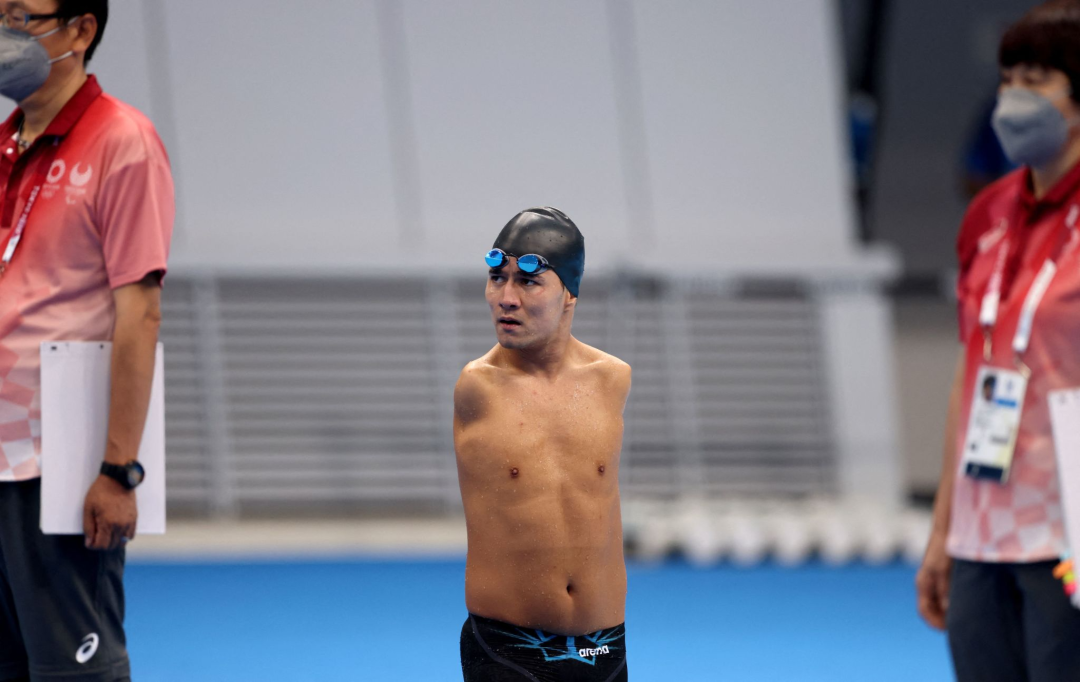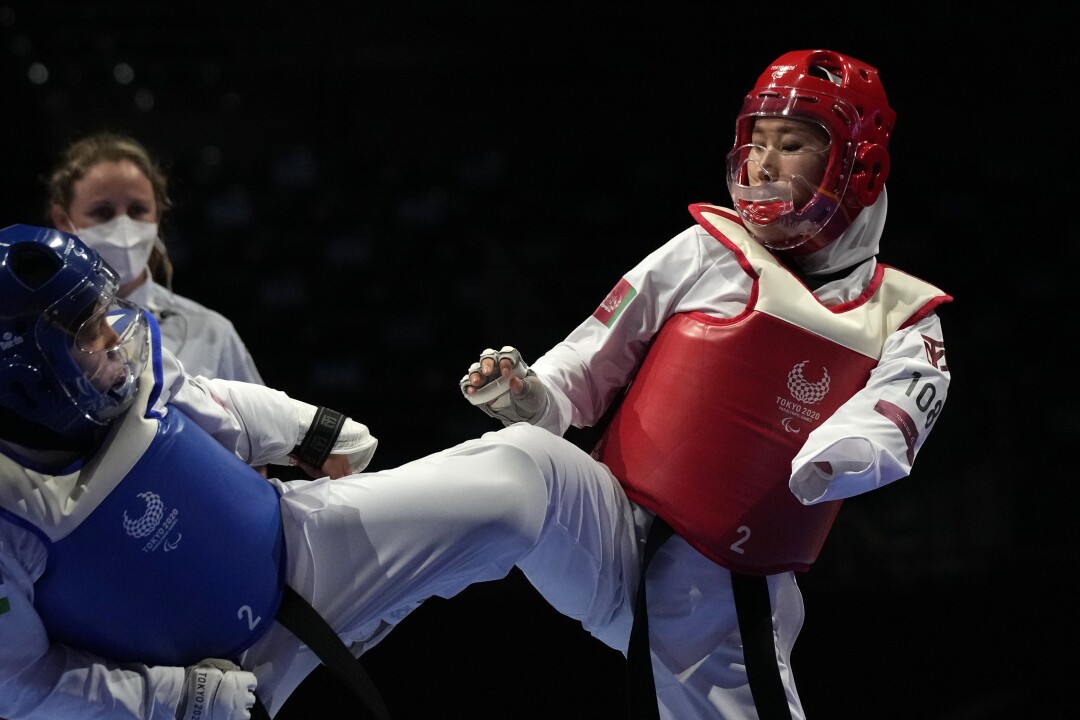Afghanistan’s Paralympic athletes stay positive amid uncertain future
After his final try at National Stadium in Tokyo, after finishing in last place, Hossain Rasouli flashed a thumbs up and a smile.
The 26-year-old sprinter, built thin with a mop of black hair and faint beard, wasn’t supposed to compete in the long jump at the Paralympics. He had qualified for the 100 meters but arrived in Japan too late.
Officials made an exception, allowing him to enter an alternate event of his choosing, for good reason: Rasouli and the only other member of the Afghanistan team were trapped in Kabul with the airport mobbed and no commercial flights leaving the country.
Only a last-minute evacuation effort by multiple individuals and governments succeeded in getting Rasouli and teammate Zakia Khudadadi to Paris and then Tokyo last weekend. U.S. jumper Roderick Townsend was startled to see Rasouli’s name on the updated start sheet.
“With everything going on right now,” Townsend said, “I couldn’t help but feel joy for him.”
Eager to hold off a media crush, officials announced there would be no pregame news conference or post-event interview. Rasouli, who lost his lower left arm to a mine explosion, issued a brief statement saying it was “a dream to participate” and he would try his best in an unfamiliar event. A spokesman for the International Paralympic Committee added: “I know it’s a great story, but we don’t have to focus on them for the rest of the Games.”
It wasn’t just Rasouli and Khudadadi. Each day has brought more news from Kabul and yet another military veteran competing in Tokyo, so many limbs lost to improvised explosive devices. As the Paralympics draw to a close this weekend, the connections to Afghanistan have been unavoidable.
::

Afghanistan’s Zakia Khudadadi, center, enters the competition venue prior to her Taekwondo match against Ziyodakhon Isakova of Uzbekistan.
(Shuji Kajiyama / Associated Press)
It was mid-July when the secretary-general of the United Nations made a customary, if often overlooked, statement that precedes every Olympics and Paralympics.
“The Olympic truce is a traditional call to silence the guns while the Games proceed,” Antonio Guterres said. “People and nations can build on this temporary respite to establish lasting cease-fires and find paths toward sustainable peace.”
His request held through the Summer Games, where five Afghan athletes competed without fanfare, but fell by the wayside shortly after.
With the deadline for U.S. troop withdrawal approaching, Afghanistan’s president fled to the United Arab Emirates and U.S. staff left the embassy by helicopter. Evacuations from Hamid Karzai International Airport in Kabul soon grew frenzied.
On Aug. 21, three days before the Paralympics, Rasouli and Khudadadi had no way to reach Japan and withdrew from competition. The announcement “broke the hearts of all involved … and left both athletes devastated,” International Paralympic Committee president Andrew Parsons said in a statement.
After consulting with the U.N. refugee agency, officials decided to have a volunteer carry the red, green and black Afghan flag in the opening ceremony. The start of play brought news both good and bad.
With outside help, Rasouli and Khudadadi made their way into the crowded airport and were taken to France. They were safe, IPC spokesman Craig Spence said, but had endured “a very traumatic process and they are undergoing counseling and psychological health tests.”
Then, on Aug. 26, explosions rocked the perimeter of the airport in Kabul, killing 13 American service members and scores of Afghans. Rasouli and Khudadadi boarded a plane for Tokyo the next evening.
Officials greeted them at Haneda Airport in what was described as an “extremely emotional” meeting with “lots of tears from everyone in the room.”
The head of the small Afghanistan team issued a statement: “I strongly believe that, through the Paralympic movement and the Paralympic Games, we all can deliver the positive message that peaceful co-existence is best for humanity.”
::
The subject came up in interviews and news conferences almost daily. Though Rasouli and Khudadadi were not speaking to reporters, athletes from other countries were.
After winning a bronze medal in powerlifting, British team member Micky Yule talked about losing both legs to an IED in 2010 while serving with the Royal Engineers in Afghanistan’s Helmand province.
As an Afghan native who sneaked out of his country and paid smugglers to ferry him to Turkey eight years ago, Abbas Karimi expressed sympathy for his former countrymen. Now swimming for the International Olympic Committee’s refugee team, Karimi was asked if it was difficult to focus on competition.
“I’m an athlete,” he said. “I cannot answer a lot of questions.”

Refugee Paralympic Team’s Abbas Karimi looks at the scoreboard after competing in the men’s 50-meter butterfly in Tokyo on August 27.
(Behrouz Mehri / AFP via Getty Images)
Military veterans on the U.S. team — those who had been injured in Afghanistan — faced similar queries. Eric McElvenny, who lost his right leg below the knee to an IED, was happy with his sixth-place finish in the triathlon but felt sadness about developments in Kabul.
“It’s weird,” he said. “It’s a challenging time.”
Another U.S. athlete, Brad Snyder, recalled being blinded by an explosion while on patrol with his assault team near Kandahar in 2011. A college swimmer at the U.S. Naval Academy in his younger days, he had returned to sports to forge a new sense of identity. “It’s tough to take off the uniform,” he said.
Within a year, Snyder had won the first of seven swimming medals he would collect at the 2012 and 2016 Paralympics. Before `Tokyo, he switched to triathlon and enrolled at Princeton to study international affairs.
“I’m in this degree to sort of make sense of the issue,” he said. “How and why did we get involved? What were the justifications, legally and morally?”
Snyder scored a surprise victory in his race, opening a lead with guide Greg Billington through the swim and bicycle sections, then holding onto first place in the 5k run. Like McElvenny, Snyder had mixed emotions.
The events in Afghanistan were “tough and awful,” but his graduate studies had led him to a place of acceptance. “I’m at peace with the situation,” he said. “I don’t think 20 years of sacrifice justifies continuing to be there.”
If nothing else, Snyder hoped the last few weeks might raise awareness about challenges in the region, the Paralympics serving as part of a global conversation that could “bring liberty and democracy in our lifetime.”
“I really am optimistic,” he said.
::

Afghanistan’s Hossain Rasouli gives a thumbs up after his first attempt in the men’s long jump at the Tokyo Paralympics.
(Eugene Hoshiko / Associated Press)
The Afghan athletes did not arrive in Tokyo as prepared as they would have liked. Instead of running at a training center, Rasouli had relied on his backyard and hills near his home.
A similar challenge faced Khudadadi after she received a wild-card invitation in taekwondo. The 23-year-old, born with one functional arm, left her family in Herat province to train in Kabul before the trouble started.
“I had just two months to prepare for the Games with almost no facilities,” she said in a release that included a photograph of her in training with a big grin and a raised fist.
Khudadadi did not fare much better than Rasouli, losing in the first round to an athlete from Uzbekistan, then bowing out of the tournament with another defeat that evening. Like Rasouli, she left without speaking to the media.

Afghanistan’s Zakia Khudadadi, right, competes against Ziyodakhon Isakova of Uzbekistan during their taekwondo match at Tokyo Paralympic Games on Thursday.
(Shuji Kajiyama / Associated Press)
Before the Olympics and Paralympics, local organizers developed a “playbook” of COVID-19 rules, one of which directed athletes to leave Japan within 48 hours of their final competition. Asked if that mandate applied to the Afghans, spokesman Spence said: “There’s a difference between principles and having to be enforced.”
Australia, which has set aside 3,000 humanitarian visas for Afghan nationals, was preparing to offer two of those places to Rasouli and Khudadadi, according to multiple reports. There was talk of keeping them around to march in the closing ceremony on Sunday.
Given how the events in Afghanistan shadowed this competition, with circumstances shifting day-to-day, the IPC was in no rush to make a decision. It seems the Paralympics had one more role to play in the crisis.
“The priority here is the health and well-being of the athletes,” Spence said, adding officials wanted to be sure that when the Afghans leave Tokyo, “they’re going to a country that will love them, respect them and give them a home.”
xfbml : true, version : 'v2.9' }); };
(function(d, s, id){ var js, fjs = d.getElementsByTagName(s)[0]; if (d.getElementById(id)) {return;} js = d.createElement(s); js.id = id; js.src = "https://connect.facebook.net/en_US/sdk.js"; fjs.parentNode.insertBefore(js, fjs); }(document, 'script', 'facebook-jssdk'));
For all the latest Sports News Click Here
For the latest news and updates, follow us on Google News.
